Information?

In the past, dentures were rather bulky and obvious, but those days are long gone. Prosthetic teeth provided by Sunny Dental are completely comfortable and fabricated to look and feel like natural teeth. Our knowledgeable, friendly team will walk you through the entire process and make sure that you leave our dental office smiling with more confidence. Do you need to replace a few teeth or all of them? You can learn more about dentures and partials in Lancaster, TX by contacting us today.


Dentures are an excellent treatment for patients experiencing all different types of tooth loss. Whether you’re missing multiple or several teeth, full and partial dentures can be custom-designed to meet your needs and restore the function and appearance of your grin. The best way to learn about what your treatment will look like and whether you’re a good candidate is to schedule a consultation with one of our skilled dentists at Sunny Dental & Orthodontics. You won’t regret taking this first step towards a healthier and happier you!

Missing teeth can have drastic consequences for your oral and overall health, confidence, and wellbeing. Oftentimes, tooth loss is caused by dental concerns like gum disease and decay, but what many people don’t realize is that this is only the beginning of a slippery slope towards declining oral health. This is because when missing teeth aren’t replaced, it can put you at an even greater risk of additional tooth loss. Not to mention, having gaps in your smile can make basic daily tasks like eating and speaking much more difficult.

Traditional dentures have been a tried-and-true tooth loss treatment for ages, helping patients in all different types of situations rebuild their smiles. They’re designed from high-quality materials like acrylic, porcelain, and ceramic to withstand daily use as well as provide a more appealing aesthetic appearance.
The fact is, it’s rarely the case that patients aren’t good candidates for this treatment. When you schedule a consultation with one of our dentists, we’ll speak with you about all of your options, like whether you could benefit most from a full, partial, or implant denture. So long as you have no lingering chronic dental health problems, like gum disease, and you’re missing teeth, you’ll likely be eligible!
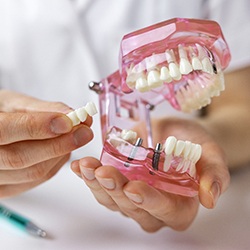
Dentures aren’t always the best option for every tooth loss situation. Our team also provides dental bridges and dental implants for patients missing consecutive teeth or those looking for a more permanent and secure answer.
We often recommend dental implants for those who are eligible because they have the ability to stop jawbone erosion from occurring over time. Instead of the dentures sitting atop the gumline, we’ll attach them to implant posts that are securely placed in the jawbone, allowing them to function like your natural tooth roots.
Dental bridges are ideal for those who are missing anywhere between one and four teeth in a row. They only require a minimal amount of alteration to your natural dental structure. They also aren’t removable and are securely anchored within the mouth.

Even if you’ve lost all of your upper or lower teeth, you can enjoy a complete smile. A full denture is a prosthetic that replaces an entire row of teeth at the same time, enabling the patient to chew food again. Full dentures also elongate the face to create a healthier, more youthful appearance. Using natural suction and dental adhesive, this traditional type of denture rests on top of the gums and is removeable for easy cleaning.

A partial denture is used when a patient still has some healthy teeth remaining. We can fill the gaps throughout the mouth with these dentures, which consist of acrylic teeth attached to a gum-colored base. Instead of relying on suction or gravity to keep the denture in place, metal clasps hold onto neighboring teeth, giving the prosthetic teeth additional stability. Typically, partial dentures can be easily removed for daily cleaning.

Once you decide to get dentures, you might have questions about what the process for receiving them looks like. Understanding how they’re made and what they’re made from will help you to appreciate your new restoration for several years to come. Here’s a little more about what goes into crafting your new smile with dentures.

Dentures consist of two main parts: the base of the denture, and the artificial replacement teeth. Here’s more about what each component is comprised of:

Since dentures are custom-made for your unique smile, receiving them is a multi-step process. Here’s a step-by-step breakdown of what this typically looks like:

It’s normal to feel some discomfort when you first receive your new dentures, but this is fortunately only temporary. In time, your mouth will fully adjust to your dentures, and you’ll hardly notice a difference between them and your natural teeth. During this adjustment phase, it’s important to stick to softer foods and exercise your facial muscles whenever possible. If you continue to encounter discomfort and extreme difficulty adjusting to your dentures, don’t hesitate to give us a call for assistance!

Dentures can help you feel better about yourself, improve your speech, and widen your dietary options. You will no longer have to settle for life with the limitations that come with an incomplete smile; with dentures, you can once again enjoy the advantages of a full set of teeth. These are just a few of the benefits dentures offer, but there are many more to consider--keep reading to learn more about them.

When you still have all of your teeth, it can be hard to fathom the idea of losing them. As such, many individuals find it hard to come to terms with tooth loss; they may become depressed, and their social lives might suffer. However, dentures can help improve your mental state by restoring the appearance of your grin and helping you regain some of your lost self-esteem. They can also help you feel less anxious about trying to speak or chew in social situations.

Your teeth and tongue need to work together to pronounce all kinds of words. As such, losing teeth can be a major hindrance when it comes to your ability to speak. However, you’ll find that enunciating your words is much easier once you start wearing personalized dentures.

Many fruits, vegetables, and other healthy foods need to be chewed properly before you swallow them; otherwise, you might not get the full nutritive benefits and might have problems with indigestion. You may even need to start avoiding some foods entirely.
Dentures can bring back some of the chewing ability you lost, making it easier for you to handle different kinds of foods. Our team can give you some advice for eating with your dentures so that you can get the most out of your meals.

While the main purpose of dentures is to replace missing teeth, they can also help you protect the teeth you still have. For one thing, they can help put a stop to dental drift, meaning your teeth will stay in their proper alignment. Furthermore, having dentures that can help share the burden of biting and chewing means that your natural teeth won’t wear down as quickly.

It’s much easier to make the kind of impression you want on potential employers and other individuals when you don’t have to worry about extensive empty space in your grin. By improving your overall appearance, dentures may indirectly make it easier for you to seize important opportunities. The sooner you have your missing teeth replaced, the better it will be for your career and personal life.

The cost of dentures varies from person to person, as every case is different and there are all sorts of different factors that contribute to the price. During your initial consultation, it will be determined exactly how much you can expect to pay for your new restoration. Until then, here are some things that you should keep in mind as you’re eager for your new smile!
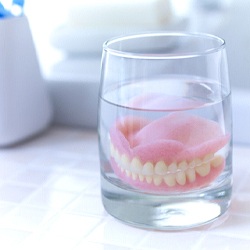
Here are the three main factors that will influence the cost of your dentures:
Remember that cheaper dentures don’t mean better dentures. If you end up opting for budget dentures, they will be more likely to require repairs or replacements much sooner than quality ones. You don’t want to end up with a subpar restoration.
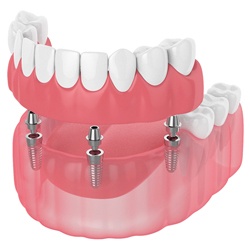
Implant dentures cost more than traditional dentures do. Instead of being supported by the shape and suction of your gums, implant dentures are held in place by a series of dental implants that are placed in the jawbone via a surgical procedure. This allows for numerous additional benefits, like being more lifelike and having additional stability. You won’t need to replace your dentures every 5 to 7 years either, as implants are made to be long-lasting!

You can expect some level of coverage for most dental insurance plans. Many provide up to 50% coverage, but this will vary depending on your plan. We are in-network with Delta Dental, and we accept all PPO insurances. If you need help understanding your plan’s benefits, we can help. Just ask a member of our team for clarification.

Just because you don’t have dental insurance doesn’t mean that you’re out of luck. You have other options that can help. We have an In-House Dental Plan. For a low annual fee, you can get regular preventive care and 30% discounts on additional procedures. CareCredit financing is also available. This third-party financing company can split the total amount of your procedure into smaller monthly payments as a low or even 0% rate.
To learn more about how much you can expect to pay for dentures, contact us to schedule a consultation. We’re eager to help you get your smile back!

Your dentures can help to transform both the appearance and function of your smile. However, even if you don’t have many (or any) remaining teeth, this doesn’t mean that you should stop going to the dentist. There are many different issues that your dentist looks out for. They will continue to monitor existing teeth and gums as well as keep an eye out for abnormalities that could indicate oral cancer. When you have dentures, it is very difficult to notice these changes in your mouth on your own. Early detection from your dentist is crucial for making a full recovery.

After you finish eating, remove and rinse off your dentures. This will help to prevent your dentures from building up food debris and plaque. When you rinse your dentures, don’t use hot water. Hot temperatures can warp the denture material and cause your prosthesis not to fit properly.
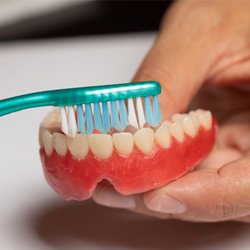
To clean your dentures, remove them first. Using a soft-bristled toothbrush and a small amount of unscented hand soap, mild dish soap, or denture cleanser, gently brush your dentures. You shouldn’t use regular toothpaste because it is too abrasive for the denture material. If you aren’t going to be wearing them again immediately, place them in a container of water or denture-cleansing solution so they don’t dry out and lose their shape. Always remember to thoroughly rinse your dentures before putting them back into your mouth. These cleaning materials are not intended to be in the mouth.

You may want to place a towel underneath you when you are cleaning your dentures. This way, if you accidentally drop them, they are less likely to become damaged. Also, remember to keep your restoration out of the reach of small children and pets.
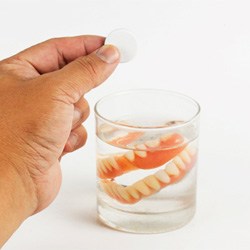
Remove your dentures when you go to bed. Wearing dentures restricts the circulation to the gum tissue and can therefore lead to soft-tissue irritation. Sleeping while wearing dentures has also been associated with a higher risk of pneumonia and higher levels of gum and tongue plaque. Overnight, keep your dentures in a denture-soaking solution.

Be mindful of changes so you can address them with your denture. This includes mouth sores, gum irritation, and signs of infection. If your dentures become damaged, you shouldn’t try to repair them on your own. You could end up accidentally damaging them further. Instead, give us a call so we can help.

In your discussions with our dental team and personal research, we hope you discover how beneficial and worthwhile dentures in Lancaster truly are for your future smile. Not only will you enjoy greater functionality and a more beautiful aesthetic, but your confidence will grow when surrounded by others. We understand the process of restoring and rebuilding your smile can be concerning and somewhat intimidating, but we believe in making sure our patients feel comfortable and confident in their dental care, which is why we’ve compiled the answers to some frequently asked questions about dentures. If you’re unsure about an aspect of your treatment, check out the information below. If you still need more clarity, don’t hesitate to contact our office to schedule an appointment.
If possible, your denture dentist in Lancaster will try to save any teeth that are not severely decayed or damaged, as it is better to keep these teeth in place for natural functionality. However, if gum disease is causing problems for your teeth and gums, it may be better to remove existing teeth and have them replaced with dentures. After all, the cost to place dental crowns can be expensive if you are treating multiple teeth. However, dentures can be much more cost-effective. When it comes to extracting teeth, your dentist will explain how many can be removed at one time and whether your extractions will involve a simple or surgical procedure.
To know if you are eligible to receive dentures, you must first understand the different types and qualifications for each. If you are missing multiple teeth along an arch, you will likely qualify for a partial denture, which works like a puzzle piece to complete your smile. If you are missing an entire arch of teeth (top or bottom), a full denture can help create a full, complete smile that sits on top of your gums and uses your natural suction to remain in place.
Also, for individuals with an entire arch of missing teeth, a more permanent solution – an implant denture – can be created. This requires having ample jawbone density to serve as the foundation for your new implants and customized restoration. The titanium posts must fuse with the bone to create a stable structure.
Anytime you are considering dentures of any kind, you must be free of gum disease, as your soft oral tissues can become infected and negatively impact the underlying bone and teeth.
Whether you are receiving dentures for the first time or having one replaced, there is an adjustment period you’ll likely go through. Every person is different, so for some, this can take a few months while for others, it may only take a few weeks. Because dentures are essentially foreign objects inside the mouth, your tongue, lips, and jaw must get used to the newness. The important thing to remember is the more you practice speaking, the quicker you will adjust to your new teeth. It is possible that you might develop a slight lisp in the beginning, however, if you do the following, it can help minimize this speech impediment:
It is best if you avoid using regular toothpaste to clean your dentures. While they should be brushed each day to avoid bacteria from building up on them, traditional toothpaste is too abrasive and will scratch your prosthetic. Instead, use a soft-bristled toothbrush and mild hand or dishwashing soap. You can also opt for denture cleaner, which is safe to use. One important note is to remember to clean your dentures after every meal.
